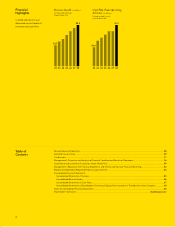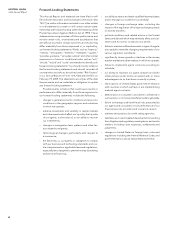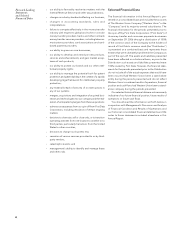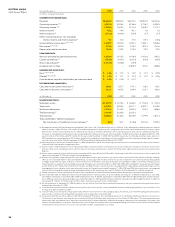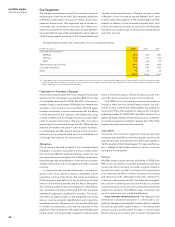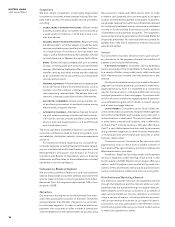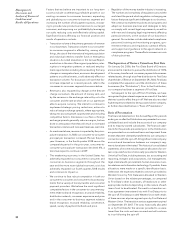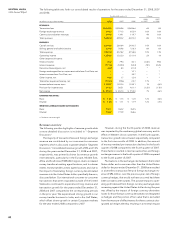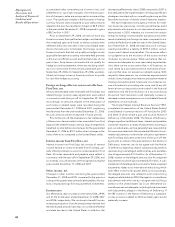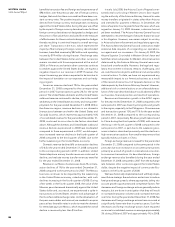Western Union 2008 Annual Report Download - page 19
Download and view the complete annual report
Please find page 19 of the 2008 Western Union annual report below. You can navigate through the pages in the report by either clicking on the pages listed below, or by using the keyword search tool below to find specific information within the annual report.17
Factors that we believe are important to our long-term
success include accelerating profitable growth in our
existing consumer-to-consumer business, expanding
and globalizing our consumer-to-business segment and
increasing the number of bill payment options, innovat-
ing to provide new products and services to our target
consumer, and improving our profitability by leveraging
our scale, reducing costs and effectively utilizing capital.
Significant factors affecting our financial position and
results of operations include:
º
Transaction volume is the primary generator of revenue
in our businesses. Transaction volume in our consumer-
to-consumer segment is affected by, among other
things, the size of the international migrant population
and individual needs to transfer funds in emergency
situations. As noted elsewhere in this Annual Report,
a reduction in the size of the migrant population, inter-
ruptions in migration patterns or reduced employ-
ment opportunities including those resulting from any
changes in immigration laws, economic development
patterns or political events, could adversely affect our
transaction volume. For discussion on how these fac-
tors have impacted us in recent periods, refer to the
consumer-to-consumer segment discussion below.
º
Revenue is also impacted by changes in the fees we
charge consumers, the amount of money sent, and
by the variance in the exchange rate set by us to the
consumer and the rate at which we or our agents are
able to acquire currency. We intend to continue to
implement strategic pricing reductions, actions to
reduce foreign exchange spreads, where appropriate,
taking into account growth opportunities and including
competitive factors. Decreases in our fees or foreign
exchange spreads generally reduce margins, but are
done in anticipation that they will result in increased
transaction volumes and increased revenues over time.
º
As mentioned above, revenue is impacted by the princi-
pal per transaction. In 2008, our consumer-to-consumer
principal per transaction increased 3% over the prior
year. However, in the fourth quarter 2008 versus the
comparable period in the prior year, consumer-to-
consumer principal per transaction declined 4%, a
trend we expect to continue in 2009.
º
The weakening economy in the United States has
adversely impacted our consumer-to-consumer and
consumer-to-business segments throughout the
year and the more recent global economic crisis has
adversely impacted our fourth quarter 2008 results
and continues to impact us.
º
We continue to face robust competition in both our
consumer-to-consumer and consumer-to-business seg-
ments from a variety of money transfer and consumer
payment providers. We believe the most significant
competitive factors in the consumer-to-consumer seg-
ment relate to brand recognition, trust and reliability,
distribution network, consumer experience and price
and in the consumer-to-business segment relate to
brand recognition, trust and reliability, convenience,
speed, variety of payment methods and price.
º
Regulation of the money transfer industry is increasing.
The number and complexity of regulations around the
world and the pace at which regulation is changing are
factors that pose significant challenges to our business.
We continue to implement policies and programs and
adapt our business practices and strategies to help
us comply with current legal requirements, as well as
with new and changing legal requirements affecting
particular services, or the conduct of our business in
general. Our activities include dedicated compliance
personnel, training and monitoring programs, gov-
ernment relations and regulatory outreach efforts,
and support and guidance to the agent network on
compliance programs. These efforts increase our costs
of doing business.
The Separation of Western Union from First Data
On January 26, 2006, the First Data Board of Directors
announced its intention to pursue the distribution of 100%
of its money transfer and consumer payments businesses
related assets, through a tax-free distribution to First Data
shareholders. Effective on September 29, 2006, First Data
completed the separation and the distribution of these
businesses (the “Distribution”). Prior to the Distribution,
our company had been a segment of First Data.
Subsequent to the spin-off from First Data, we have
recognized higher interest expense as a result of the debt
that was issued to effect the spin-off. We have also recorded
higher expenses related to being a stand-alone company,
as further described below in “Basis of Presentation.”
Basis of Presentation
The financial statements in this Annual Report for periods
ending on or after the Distribution are presented on a con-
solidated basis and include the accounts of our company
and its majority-owned subsidiaries. The financial state-
ments for the periods presented prior to the Distribution
are presented on a combined basis and represent those
entities that were ultimately transferred to our company in
connection with the spin-off. All significant intercompany
accounts and transactions between our company’s seg-
ments have been eliminated. The historical consolidated
statements of income include expense allocations for cer-
tain corporate functions historically provided to Western
Union by First Data, including treasury, tax, accounting and
reporting, mergers and acquisitions, risk management,
legal, internal audit, procurement, human resources, inves-
tor relations and information technology. If possible, these
allocations were made on a specific identification basis.
Otherwise, the expenses related to services provided to
Western Union by First Data were allocated to Western
Union based on the relative percentages, as compared
to First Data’s other businesses, of headcount or other
appropriate methods depending on the nature of each
item of cost to be allocated. Pursuant to a transition ser-
vices agreement we entered into with First Data prior to
the spin-off, First Data provided Western Union with certain
of these services at prices agreed upon by First Data and
Western Union. The transition services agreement expired
on September 29, 2007. The costs historically allocated
to us by First Data for the services provided to us were
lower than the costs we have incurred and will continue
to incur following the spin-off.
17
Management’s
Discussion and
Analysis of Financial
Condition and
Results of Operations


